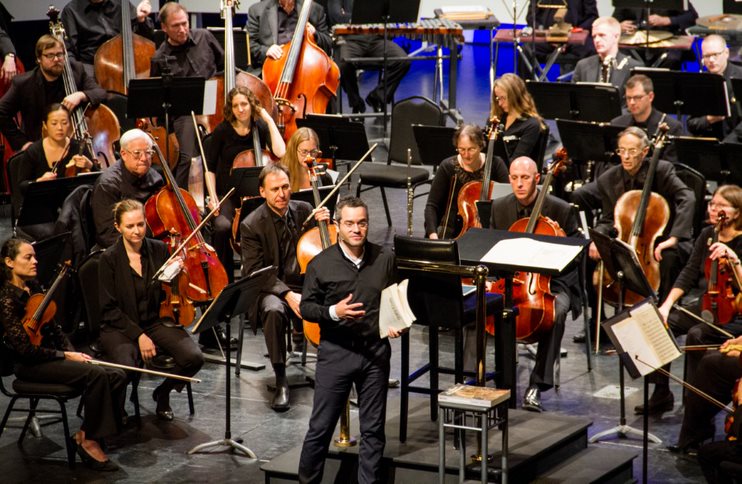Why college students should listen to classical music
A discussion with Elgin Symphony Orchestra music director Andrew Grams
The Elgin Symphony Orchestra performed pieces from Richard Wagner’s “The Ring” on Nov. 2. at the Hemmen’s Cultural Center, Elgin. As part of their “Inside The Music With Andrew Grams And The ESO” program, Grams broke down the vivid imagery behind Wagner’s fantastical epic drama based loosely upon ancient Norse sagas
November 15, 2018
My grandmother is a resolve to a dominant seventh chord. I only vaguely remember her laugh. But when the subtle strings raise the elegant opening melody of Aaron Copland’s “Our Town Suite,” I once again see her smiling face.
Music can be reduced to cold, rigorous mathematical expressions. Humanity’s desire to quantify material existence with arranged patterns of air molecules traveling through space and time. For Andrew Grams, music director of the Elgin Symphony Orchestra, real beauty often escapes the quantifiable.
“I struggled for many years looking for concrete answers,” said Grams. “I now find myself more inclined to the abstract. Concreteness limits one’s personal experience.”
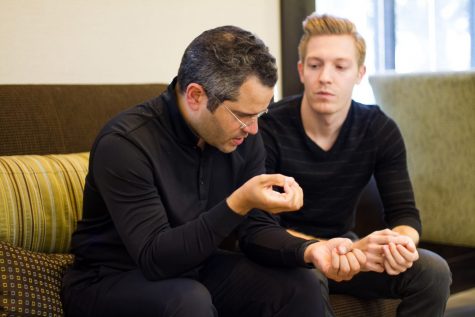
Andrew Grams discussed with journalist Joey Weslo the eternal struggle to capture beauty and meaning through composition. Grams will break down Wolfgang Amadeus Mozart’s “Jupiter Symphony” in his next ‘Inside the Music” on March 22
Grams has directed orchestras throughout America and worked with symphonies across the globe. He is conducting his sixth season with the award-winning Elgin Symphony Orchestra.
He believes there is a biological disposition attracting us to music. Grams said experiences like mine are attributed to our brains evolving to seek patterns and deliberate on different problems and solutions.
“With rich, serious composed music with multiple-layers, many parts of the brain become activated,” he said. “Memories come alive, and deep personal experiences are brought forth. Mathematical centers of the brain activate as we try to measure out time by deducing rhythm. Through rhythm, we can expand and contract the perception of time at will. Tempo, rhythm and articulation can make time stand still or speed up.”
Grams’ orchestra endeavors to present music of civility without the high-class snobbery of affluence. Stripping away the pretentious façade, Grams wants the focus centered on the music, and how it affects listeners subconsciously.
“I want people attending the show to go inside themselves and identify what moved them,” said Grams. “What impacted you emotionally? What repelled you? Why is this part of the piece more powerful to you? What does that say about you?”
Each piece is a psychological examination of your inner-psyche, an exploration of your hidden subconscious. Music isn’t just an appreciation of beauty; it’s an attempt to ascertain the abstract spectrum of emotions evading our mathematical reasoning.
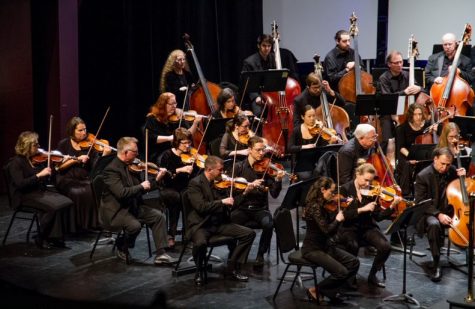
The Elgin Symphony Orchestra has won Illinois Professional Orchestra of the Year a record-setting four times. Here they raise the thunderous tumult of Wagner’s “Ride of the Valkyries”
“Richard Strauss wrote very strict pieces with concrete subjects,” said Grams. “People would come to the composer after listening and ask if what they inferred was what he was trying to convey. Strauss would always reply, ‘What did it mean to you’?
“It is natural human desire to make things concrete. However, you can play the exact piece multiple times, and your current emotional state completely changes how you perceive the music. With the audience, individuals can find themselves in certain mental states that heighten a visceral response.”
Grams wants the orchestra to bring people together and submerge them in both a unifying and individual emotional experience.
He believes people should open their lives to classical music because it’s inherently richer in substance and offers the audience deeper experiences than average pop music. Composed to portray multiple subjects and states of being, pieces blend different tastes and innovations trying to create new adaptations of expression.
Musing on Copland’s “Our Town Suite,” Grams said its simplicity moves him in ways he struggles to identify.
He wants audience members to undergo the same existential pondering. His orchestra performed the piece while I was in attendance last season, evoking nostalgic reverie within me, conjuring up long-forgotten memories of people and places that only survive within my subconscious.
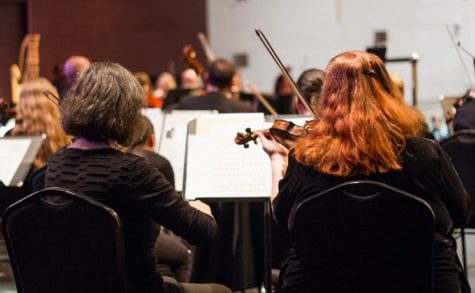
“The greatest music was never created trying to follow the rules. The composers were trying to find beauty and communicate to the emotions of the human soul.” – Andrew Grams
“I would be interested in what you find out about yourself as you listen to a piece as emotionally-charged and simple as Camille Saint Saens “The Swan,” said Grams. “My favorite part is the end where the cello rises to the final ‘G’ and holds. Everything then tinkles down to the bottom. I can’t explain it. I can describe technically how the upper-violins are in their descending harmony, but on the abstract level, it creates this sublime moment for the listener.”
Sharon Jones has been a member of the orchestra’s horn section since 1994 and is the music archivist at the College of DuPage. She began playing the French horn at 15 and fell in love with the stories compositions can tell.
“Bela Bartok was an ethnomusicologist who would go to Hungarian villages recording folk songs and implementing their styles into his compositions,” said Jones. “His pieces tell stories brilliantly and are vivid with wild creativeness.”
She loves the chaotic tension and conflict conveyed in Bartok’s “The Miraculous Mandarin.” Through depicting New York’s traffic, a heroic fight scene and the protagonist’s tragic death, Jones believes the music heightens our appreciation of story-telling. The rich imagery challenges us to observe the complexities of life through multiple perspectives.
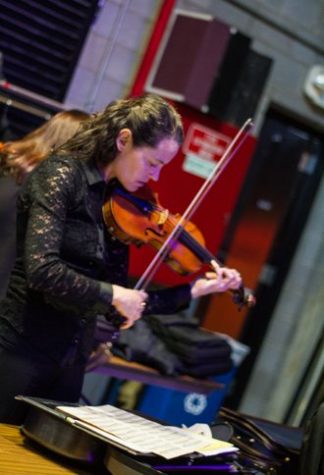
Violinist and concertmaster Isabella Lippi will star in Elgin Symphony Orchestra’s Jan. 11 performance of Joseph Haydn’s “Surprise Symphony”
Grams’ job as the conductor is to architect the individual emotions of each musician and guide them into a single artistic expression.
“Their personalities are like individual faucets, each springing from an inner emotional well,” said Grams. “When playing together, the water comes gushing out, and I have to channel it into the artistic direction each piece requires.
“Music is not an entity; music is a tool to communicate. A composer strives to connect with the listener.”
Referencing the academic studies of music theory, Grams stressed theory did not create classical music. Theory is how we currently try to reduce compositions to their mechanics. These mathematics can be cold and uninviting.
“The greatest music was never created trying to follow the rules,” said Grams. “The composers were trying to find beauty and communicate to the emotions of the human soul.
“If I began school all over again, I would find those pieces that really speak to me. I would then apply theory and see if it fits or breaks traditions. What moves me emotionally, and how does the composer accomplish this? Music theory tries to explain something ephemeral; its beauty is not concrete.”
Grams referenced the ancient Greek philosopher Pythagoras’ Music of the Spheres theory, which postulated there is a mathematical and musical foundation to the metaphysics governing the universe. He sees such reasoning as natural human tendencies emanating from our curiosity and desire to comprehend existence on a scientific level.
However, Grams believes to appreciate the beauty and visceral emotionality of compositions, you must find a separation between the mathematics and the music itself.
He believes this enabled him as a child to become vividly inspired the first time he heard the second movement of Ludwig van Beethoven’s “Symphony No. 7.”
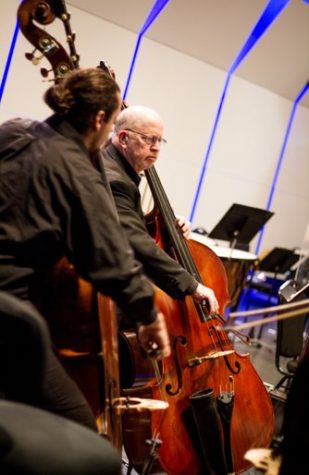
The Elgin Symphony Orchestra’s next performance will be “ESO Sounds Of The Season” played on Dec. 8 and 9. They will be accompanied by conductor Stephen Squires and the Elgin Master Chorale
In traveling across the world, from France to New Zealand, Grams has seen these sentiments echoed within the relationships different cultures have with classical music.
He believes compositions like Johannes Brahms’ “Hungarian Dances,” or Igor Stravinsky’s inspiration from Russian folk songs, or Charles Ives’ recreating old Yankee songs, represent a celebration of unique cultures and permit its citizens an outlet to unite in emotion.
“Beethoven’s (“Symphony No. 5.”) represents to Western civilization the struggle in going from darkness to light, from fate’s impending doom to victory. However, in non-Western cultures like India, we’ve had people find the piece disturbing and shocked music would dare be so brutal. The differences in culture are emphasized by their reactions to the different emotions the composer is trying to evoke within them.”
Together, each reaction provides a lense depicting the collective tapestry of the human experience. Its universal appeal elucidates what unites and divides our cultural dispositions.
Grams believes on both a holistic and individual level, this psychological examination is crucial for greater personal understanding.
“When I was younger, I was fascinated with (Gustav) Mahler, Strauss and (Dmitri) Shostakovich, but as I’ve aged, I find myself gravitating to music with less darkness. I seem to desire more levity to life,” said Grams.
He said we can decipher society’s temperament by studying what pieces they gravitate towards. He noted the prevalence of Samuel Barber’s heart-wrenching “Adagio for Strings” whenever a national tragedy has occurred and people are in mourning.
“It’s interesting. As human beings we turn to such dark pieces to rectify our emotions. We search for consolation or release through tragic music,” said Grams.
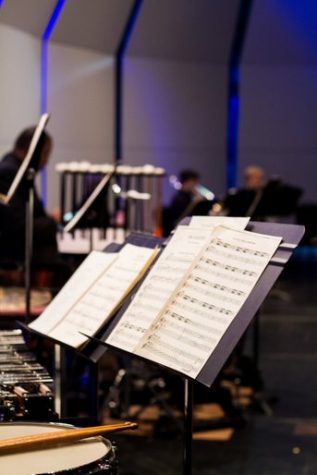
FOR MORE INFORMATION ON FUTURE SHOWS, VISIT: www.elginsymphony.org/
An examination insinuates we search for an affirmation for the darker emotions we have within us. We see our inner-anguish reflected upon another, and this consoles our desire to not be alone in times of personal struggle.
Grams believes the opposite can happen when music ignites within us universal feelings of euphoria.
As the Elgin Symphony Orchestra continues its 68th season, Grams hopes people will open themselves to the full spectrum of discovery and emotion brought to life by the music.
“It doesn’t matter your age, if you can isolate the music, you can appreciate the beauty it possesses,” said Grams. “You need to be willing to put yourself in unfamiliar and unexpected situations. Don’t bring expectations or preconceived notions. Just be willing to listen with complete openness, and see what happens within you.”

